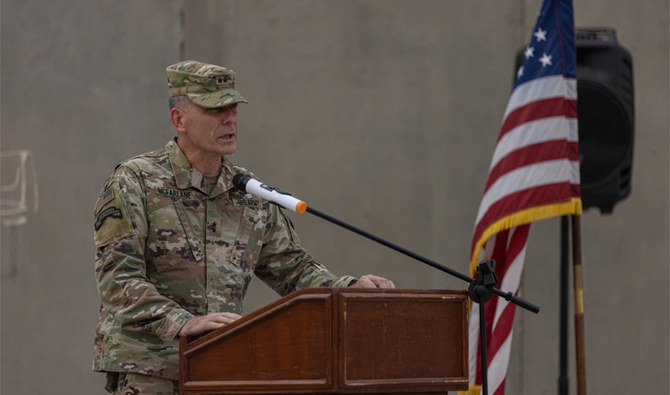
- ARAB NEWS
- 01 Jul 2025

CHICAGO: A US military official said on Wednesday that the war to defeat Daesh in Iraq and Syria continues to advance, citing as proof of progress a significant year-on-year reduction in terrorist activities.
During a briefing attended by Arab News, Maj. Gen. Matthew W. McFarlane, commander of the Combined Joint Task Force — Operation Inherent Resolve, which includes forces from more than 30 countries and is based in Iraq, said there has been a “65 percent reduction” in terrorist activity by Daesh in the past year. The group is no longer militarily operational, he added, but individual remnants continue to be responsible for some incidents of violence.
Therefore, although the continuing mission to target Daesh supporters and their ideology in Iraq has been very successful, remaining members of the group continue to operate in areas outside of the coalition’s reach, he said.
“Daesh no longer controls any territory and have suffered losses of their leaders and fighters at large,” McFarlane said. “We continue to see a decrease in Daesh attacks, year on year — this year a 65 percent or greater (reduction) from last year. This last Ramadan was the most peaceful Ramadan in recent history, according to our Iraqi colleagues.
“But they (Daesh) continue to degrade. Not just in attacks but in all measurable categories I am aware of. They continue to decline or degrade (in terms of) finances, military and just numbers that we are tracking that are part of the organization. Having said that, there are still radical fighters out there that aspire to reemerge or rebuild the caliphate.
“In the last few years, the Iraqi security forces have made tremendous strides in defeating Daesh and continue in their efforts to prevent the reemergence of Daesh. While Daesh has been defeated militarily, we know their dangerous ideology remains a threat and they continue to aspire to regain some type of military capacity. That is why we continue to work with our partner forces in our shared mission to ensure the enduring defeat of Daesh.”
The US-led coalition provides support for Iraqi military forces but is not actively engaged in fighting Daesh, he added, and works with the Syrian Democratic Forces, a coalition of ethnic militias and rebel groups in northern and eastern Syria.
Many regional challenges remain, McFarlane said, including the repatriation of displaced persons and Daesh detainees currently in northeastern Syria and their reintegration into their home communities.
A particular area of concern in Syria, he added, a country that remains deeply divided, is that there remains the potential for violence to escalate in some areas there.
“Daesh has increased attacks in areas that are not controlled by the coalition,” McFarlane confirmed.
Asked about the situation in Syrian territory controlled by Russian forces, he responded that their “unsafe and unprofessional actions are certainly unwelcome and put our forces and their forces at risk.”
McFarlane admitted that progress in the battle against Daesh is still “fragile” and that the “prospect of a (Daesh) resurgence remains a possibility,” despite signs of the “decreasing effectiveness” of the terrorist organization.
“The ISF (Iraqi Security Forces) show great progress but the threat to the US, to the coalition, still remains and the progress and stability we see can be fragile, if you look at what Daesh is aspiring to do, which was demonstrated over the last month in different parts of Syria,” he said.
“While they’ve been militarily defeated — they no longer hold ground — we must not be complacent. Their evil ideology persists and the prospect of a resurgence remains a possibility.
“I believe the progress we are making with our partners here, and the Iraqi Security Forces are (taking) the lead in this fight in Iraq, is an example of what we are trying to do in Syria, and we continue to see the results of this campaign in the data, which is the decrease in attacks as well as the decrease in the effectiveness of those attacks year on year.”
The recent Joint Security Cooperation Dialogue between the US and the Iraqi leadership reaffirms the bilateral security partnership between the countries and their shared interests in the stability of the region, McFarlane added.